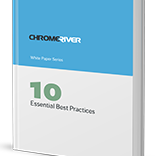 With employee travel and entertainment (T&E) spending accounting for up to 6% of total corporate costs and continuing to increase, it's wise for companies to monitor T&E spending. Lack of careful T&E oversight can open the door to fraud, policy violations and corporate waste. Consider the below tips to keep your corporate T&E spending in check.
With employee travel and entertainment (T&E) spending accounting for up to 6% of total corporate costs and continuing to increase, it's wise for companies to monitor T&E spending. Lack of careful T&E oversight can open the door to fraud, policy violations and corporate waste. Consider the below tips to keep your corporate T&E spending in check.
Use Receipt Limits as an Overall Indicator
The IRS requires receipts to have a value of at least $75, but a more common limit for most companies in the U.S. is $25. Violations within the receipt limit policy are not likely to account for a large proportion of T&E spending, but they are worth monitoring because of their predictive value. Companies with high rates of receipt limit abuses are also likely to see a high amount of T&E waste.
Only Pay Once for Expenses
A good expense management system can easily identify an expense listed multiple times on the same expense report but an expense that is listed on separate reports is not as easy to detect. The expense might be submitted on two reports by the same employee or the same expense could be submitted by two employees on their individual reports.
An employee might claim a restaurant dinner on an expense report immediately upon returning from their trip. At the end of the month when their credit card statement arrives, they forget submitting this expense previously and submit it again. Another example is two employees sharing a taxi. One may pay for the taxi with the company’s credit card and submit it as a credit card expense while the other might submit the claim on a separate report as a cash expense.
Pay Attention to Red Flags
Cash payments can be necessary on a business trip. Not every business will accept a company credit card and not all payments lead to receipts so a business traveler could take advantage of this for personal gain. For example, they can use their own credit card to obtain rewards points or they can try to get around a non-compliant merchant category code that has been blocked by using cash and then requesting reimbursement. Monitoring expense reports for a higher-than-expected proportion of out-of-pocket spending and checking for out-of-pocket expenses with the same date and charge as previously submitted expenses on other reports will help identify and avoid this type of fraud.
Classify Expenses Properly
This task is easier with an expense reporting system that captures photographed or scanned receipts and provides electronic reports and drop-down menus that offer proper expense classifications. There still can be intentional or unintentional selection of incorrect categories, however. Misclassification of expenses can affect IRS tax deduction eligibility, incorrectly classify the distribution of spending, and mask non-compliant company expenses.
Know Expected Hotel and Meal Expenses
Have a general idea of what is normal for a city’s hotel and meal costs, and investigate outliers. A good expense reporting system like Chrome River EXPENSE will catch any overages and ask the employee to justify the expense before it is approved. Keep in mind that some travelers like business development or sales representatives may need to spend more to treat clients or prospects to meals that help build long lasting relationships and ultimately close sales.
A combination of effective T&E training and policies coupled with advanced expense reporting software will help assure appropriate corporate T&E spending.
Subscribe
Latest Posts
Posts by Category
I just love the Chrome River application. I could probably sell it! Finance Administrative Coordinator Law Firm, 800 Employees
Can’t we just move year-end, so that we can roll out Chrome River sooner!? Financial Systems Director Law Firm, 300 Employees


Comments